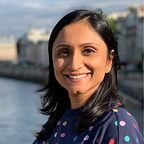Hello Anxiety.
I have been acquainting myself with something, deeply, without even realising: anxiety. Until recently, this word did not mean much to me. I knew the meaning of it. Heard of it many times before. But never stopped to give it any kind of a proper thought. Why should have I? It was not something I was struggling with. Or so I thought.
Heartbeats quickening. Countless thoughts racing through my head at a lightning speed. My chest tightening. Is that fight-or-flight kicking in? Doesn’t matter. I have gone numb. Frozen. Total chaos on the inside. Utter silence on the outside.
The silent chaos.
How many times had it happened before? I do not know. I had never thought much of it. I had powered through, as I do ever so often in my life. This is mere uneasiness — it shall pass. Why bother when it is fleeting? Ignore. And march on.
Ignorance is bliss, right? Wrong. There is no glory, nay sense, in powering through and sacrificing your mental, thus also physical health. Resilience is good, but too much of it is not.
My therapist recommends I should take five deep breaths whenever my anxiety is triggered. Sure, I can do that. Sounds simple enough.
But when in the thick of it, this very simple act of breathing is daunting.
It feels more difficult than interviewing for any high-stakes job that I passionately and single-mindedly may have wanted, more difficult than speaking to an audience of hundreds, or even moving to foreign countries where everyone is a stranger and everything, including the language, is new. These, I have done, and more. My mantra is, if it scares you, do it. Anything that takes you out of your comfort zone will inevitably broaden your horizon. Even then, this mundane act of breathing, when all hell has broken loose in my head, is the most difficult task I have ever undertaken.
Mastering our minds is the greatest and the most important challenge of our lives. We are what we think.
Our thoughts have the power to make or break us. It is crucial that we are mindful of them. Thoughts are usually not being let in, they simply come. To not think a specific thought is a lost battle – by the very act of trying not to think about it we end up doing just that. The mastery lies not in not thinking a thought, but in acknowledging its existence, analysing it, and reorienting and/or broadening our perspective around it. This is a skill. And like any skill, it can be learnt and needs practice. The more we practice, the better we are at it.
I struggled with anxiety as a new mother. My anxiety was rooted in a specific set of incidents that occurred very soon after having the baby.
The first time I felt like myself again after many months of struggle was after a couple of sessions of counselling. An incredibly supportive partner, an ever-present best friend, caring for and spending time with my baby, and writing were invaluable to my healing process.
Now that I am in a much better head space, I am able to disentangle and analyse the what’s and why’s of the incidents that set my anxieties in motion. And because of this I understand myself and my environment better.
I understand that we cannot control our surroundings, the people around us, what they do, say or how they act. What we can control is how we react to it, both internally and externally. Curated thoughts lead to curated actions and reactions. I am convinced that for me this is the way to go, that this is a smart, long-term solution to managing my triggers.*
So now, I have a plan. When triggered, take a few deep breaths, and use this time to pause, recalibrate and decide on a course of action. No action is also an action, and sometimes the best one.
This plan works. Although it often becomes challenging to execute especially when I am faced with my core triggers.
This is a journey. I am still learning. And that’s OK.
*This is not to say that any type of anxiety can simply be managed with mind exercises with or without counselling. There are times when medications are necessary. Factors underlying anxiety disorders are complex and still actively being researched. If you or someone you know is struggling, please redirect them to a medical professional.
